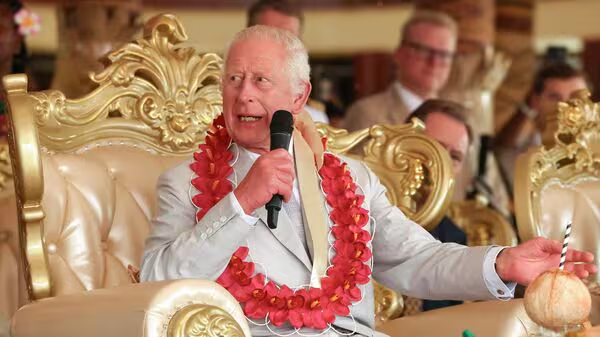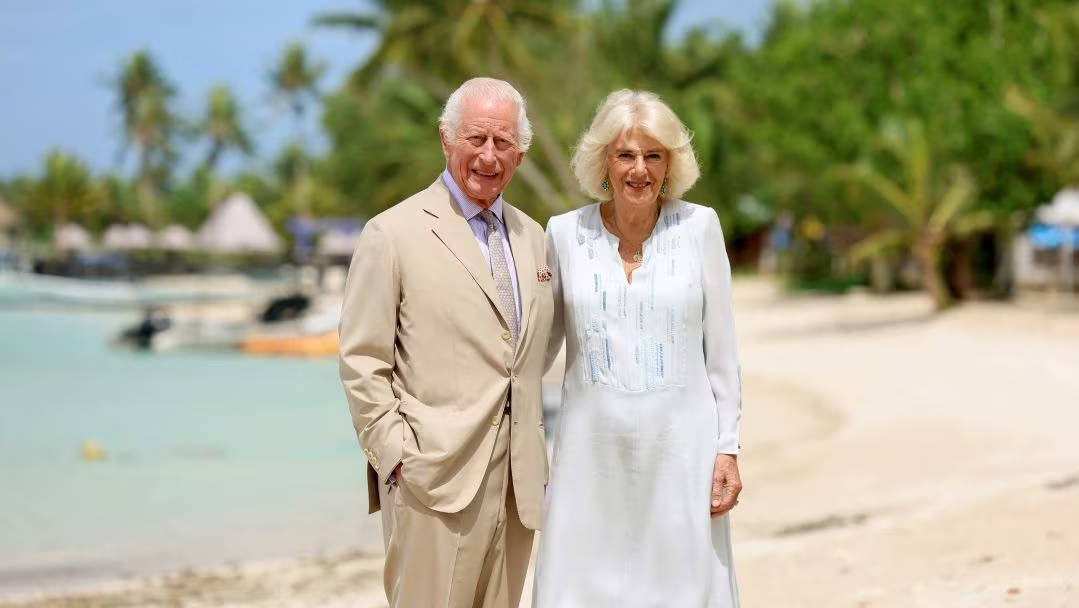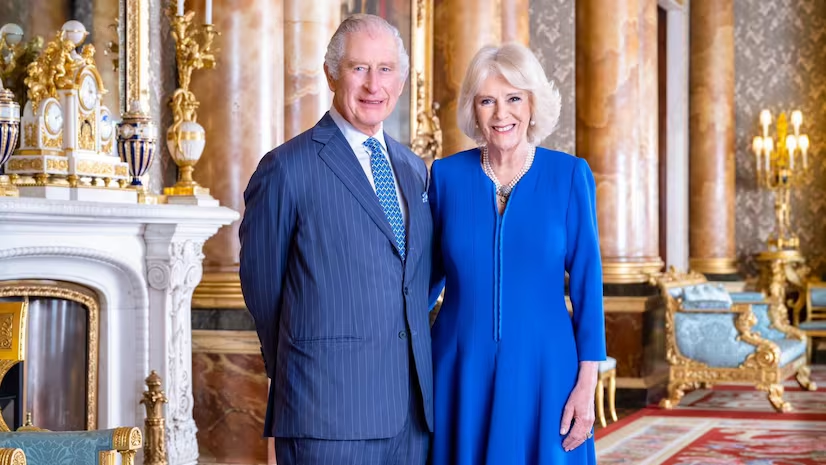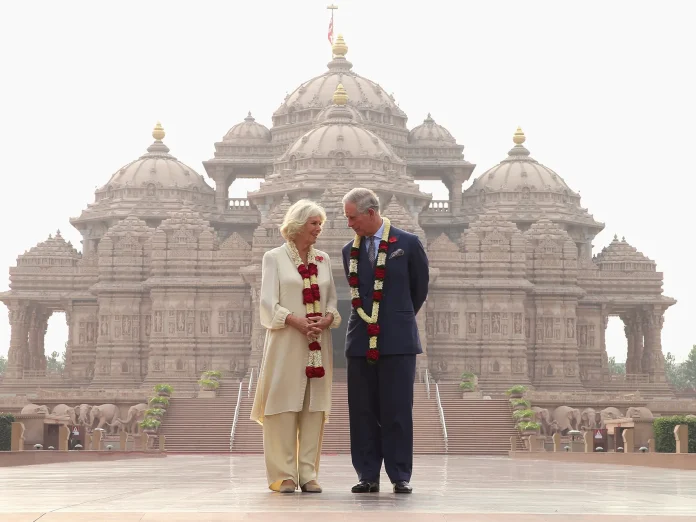King Charles and Queen Camilla Conclude Asia-Pacific Tour with Private Stopover in India for Holistic Wellness
Bengaluru, India — King Charles III and Queen Camilla made a brief but significant stopover in India following a whirlwind tour of Australia and a visit to Samoa for the Commonwealth Heads of Government Meeting (CHOGM). The Royal couple, en route back to the UK, took the opportunity to rest and recharge at the Soukya International Holistic Health Centre, a peaceful retreat in Bengaluru that has been a favored wellness sanctuary for King Charles in previous years.
Their stay at Soukya, beginning on October 27, allowed the King and Queen to unwind after an extensive diplomatic journey across the Asia-Pacific. The visit comes shortly after King Charles, 75, made headlines for being diagnosed with a health condition that, while undisclosed by the Palace, has been confirmed as manageable. Buckingham Palace emphasized that the stopover was a planned respite, with one royal source explaining, “This visit is to allow the King to rest after a long period of travel at a location that he finds peaceful and familiar.”
The trip to India, though private, generated interest in both the Indian and international press. Buckingham Palace clarified, “Their Majesties had a short private stopover in India to help break the long journey back from Samoa,” while confirming the couple’s return to the United Kingdom on Wednesday morning.
Soukya, the health and wellness center near Bengaluru, provides an ideal space for the King, who has championed alternative therapies and integrated medicine for decades. Founded by Dr. Isaac Mathai, Soukya offers a blend of Ayurveda, yoga, naturopathy, and other complementary therapies aimed at restoring balance to the body, mind, and spirit—a holistic approach that aligns well with the King’s philosophy on health and wellness.

The centre, whose name means “well-being” in Sanskrit, has hosted King Charles multiple times. Images of his visits over the years grace the center’s website, and the King himself has left a personal testimonial on the site’s homepage. The King and Queen reportedly spent their days at Soukya engaging in yoga and meditation, practices that are known for promoting mental clarity, physical relaxation, and emotional grounding.
A longtime advocate of alternative medicine, King Charles is also president of the Royal Medical Society of Integrated Health in the UK. His connection with India goes beyond wellness tourism; he has visited the country numerous times, fostering ties with various communities and promoting sustainability projects. His appreciation for Indian culture is further exemplified through his previous support for organic farming and educational initiatives, particularly with rural communities in India.
Throughout his years as a public figure, King Charles has emphasized the importance of natural healing methods, often drawing attention to the advantages of integrated medical approaches. His visit to Soukya is a reflection of this commitment, demonstrating that even as he assumes the responsibilities of a monarch, he continues to prioritize health practices that resonate with him personally.
Since the 1980s, King Charles has been vocal about exploring the synergy between modern and traditional medicine. His involvement with holistic wellness practices has been consistent over the years, even as he navigated controversies surrounding his advocacy for untraditional medical approaches. The King’s beliefs in the benefits of organic produce, herbal remedies, and sustainable agriculture remain an integral part of his public and personal ethos.

The private visit to India marked the conclusion of a highly anticipated tour for King Charles, who embarked on his first major trip as monarch to Australia, where he serves as head of state. The Australian tour involved a series of diplomatic engagements, public appearances, and environmental initiatives—a fitting agenda given Charles’ enduring interest in ecological preservation.
The monarch’s schedule included discussions on climate change, a cause he has passionately advocated for decades. In Australia, he met with state officials and community leaders, emphasizing the Commonwealth’s shared goals of addressing climate and environmental challenges. Following Australia, the King made a short visit to Samoa to attend the CHOGM, where he interacted with leaders from across the Commonwealth.
The King’s diplomatic mission underscored his dedication to the Commonwealth, a legacy passed down from his late mother, Queen Elizabeth II, who had long envisioned the Commonwealth as a platform for dialogue, understanding, and shared progress among nations.
In Samoa, his speech highlighted the importance of unity and cooperation among member nations. “The Commonwealth represents a family of nations, united by our commitment to a more just, peaceful, and sustainable world,” King Charles said, reiterating his vision for a collaborative approach to global challenges.
The Commonwealth’s 56 member nations represent diverse cultures, economies, and ecosystems, each grappling with unique environmental and socio-economic issues. The King’s presence and his message in Samoa reinforced his intention to lead the Commonwealth with empathy and respect for diversity, while advocating for a unified approach to global issues such as climate change and economic resilience.
While Buckingham Palace has refrained from elaborating on the nature of King Charles’ recent health concerns, sources close to the Royal family emphasized that his condition is manageable and not life-threatening. The King has maintained a full schedule despite his diagnosis, showcasing his resilience and commitment to his role.
The stopover at Soukya served as a brief pause, allowing the King to recharge in a setting he deeply values, surrounded by the practices and philosophies that align with his personal beliefs. Upon returning to the UK, King Charles is expected to continue his cancer treatment and resume his responsibilities, including meetings with officials, public appearances, and family obligations. His health journey, although managed privately, has sparked empathy from the public, further strengthening the emotional bond between the monarch and his subjects.
The Royal couple’s visit to Soukya has garnered interest among fans, healthcare advocates, and those curious about alternative medicine. Indian media outlets have praised the King’s appreciation for India’s traditional healing practices, with one report highlighting his “spiritual connection” with India. Similarly, public response has been largely positive, with supporters acknowledging the importance of holistic healing and lifestyle practices.

For advocates of alternative medicine, King Charles’ decision to take time for holistic healing resonates with the broader theme of prioritizing well-being amid demanding public roles. The Soukya visit has also brought additional visibility to India’s thriving wellness tourism industry, which draws thousands of international visitors each year, seeking traditional therapies, yoga retreats, and Ayurvedic treatments.
As King Charles prepares to resume his responsibilities in the UK, his visit to Soukya stands as a testament to his commitment to self-care and personal well-being. The King’s long-standing dedication to alternative health, combined with his public service, reflects the dual priorities that define his reign. His willingness to engage in traditional healing practices symbolizes his respect for ancient wisdom while also underscoring the universality of wellness across cultures.
In an era marked by increasing mental health awareness and a demand for alternative healthcare, King Charles’ personal health journey and dedication to self-care offer a positive example for the public. His approach underscores the idea that wellness and public duty can coexist, illustrating the importance of balance as he navigates the demands of his new role.
The royal visit to India may have been a private affair, but its significance resonates on a much broader scale, celebrating the ties between East and West, the embrace of holistic wellness, and the steadfast dedication of a monarch committed to his people and to his own personal well-being.




